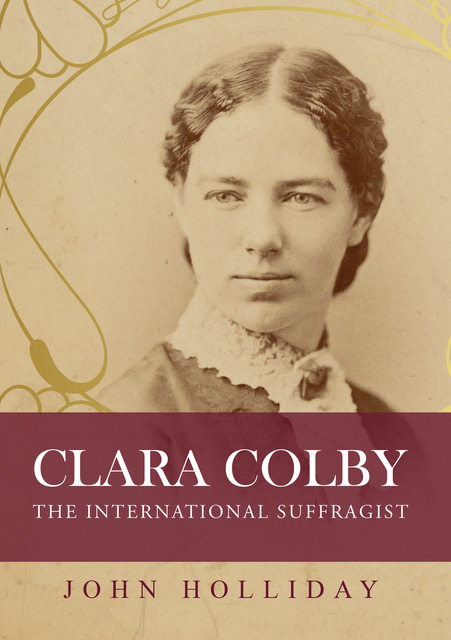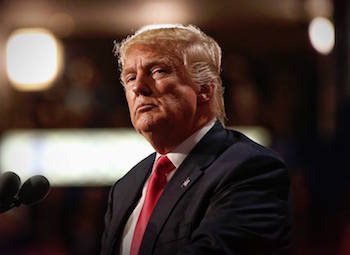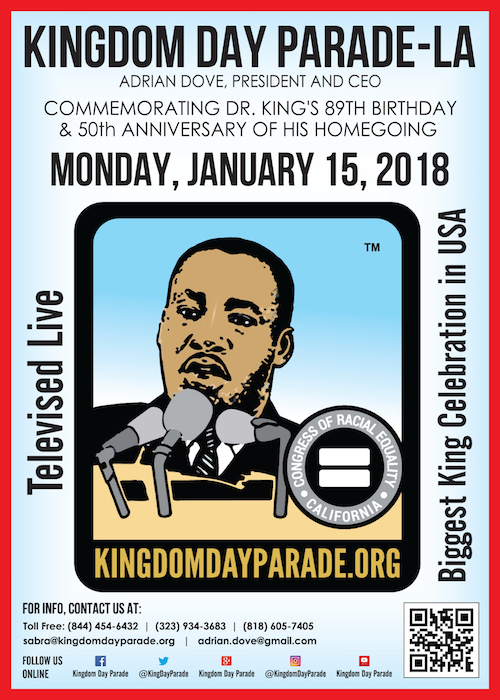Magazine, The Immigrant Experience, By John Holliday
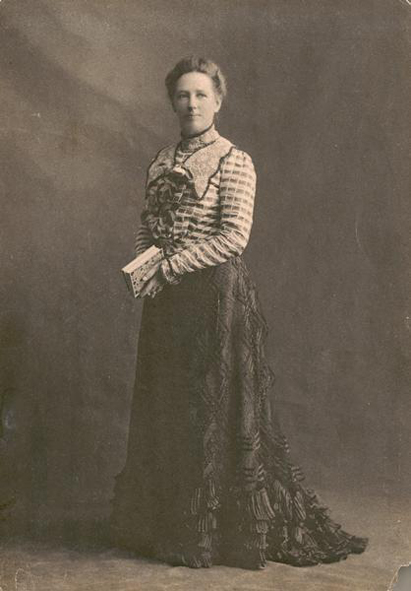
Clara Bewick Colby
We may never know why three-year-old Clara Dorothy Bewick was left behind in England when her parents and three brothers departed for a new life in America. Her parents Thomas and Clara Bewick were migrating to America, and the family had been talking about little else in the months leading up to their departure. They were leaving on the sailing ship Olympus from Bristol, and little Clara was in tears when she found that she could not join them. She later wrote an essay that revealed how she felt on that day.
The very earliest recollection of my life is kissing my mother ‘goodbye’ at someplace, and then riding off with my father somewhere in a great dark house, which afterward I learned was a railway train.1
The year was 1849, and one possible reason why Clara was left behind could be that she showed symptoms of an infectious disease. If that were the case, then the most likely suspect would be cholera, for the country experienced a cholera epidemic that year. No ship’s captain would permit anyone with possible cholera symptoms to board their vessel, which would raise the threat of quarantine on arrival in New York. With all the family possessions either sold or packed for shipment aboard the Olympus, there was no option but to arrange for Clara to stay with her grandparents until she was well and arrange for her to make the journey later. Hence the trip by railway to London, where the grandparents lived.
Although this was a painful experience for Clara, it may have been an event that helped to shape the smart and tireless woman that she became. Raised as the beloved only grandchild in London, she had a substantial emotional and intellectual foundation by the time she arrived at the Wisconsin frontier in 1855, which sustained her through a hectic and often stressful life. The advantage she achieved helped her become the valedictorian for the first class of women to graduate from the University of Wisconsin and enjoy a career as a teacher, a writer, a prominent suffragist, and a newspaper editor. After teaching at the university, she married the dashing civil war veteran, Leonard Colby. This would prove to be a rare misstep as Colby was persistently unfaithful to her, duplicitous and dishonest, even though Clara continually believed his expressions of regret and continued to declare her love for him. After Colby graduated from the law department, they moved to Nebraska, where he practiced law and was twice elected to the state senate. It was here that Clara Colby first met and befriended Susan B. Anthony and Elizabeth Cady Stanton, whose influence led to a lifelong commitment to the suffrage movement, both in America and internationally.
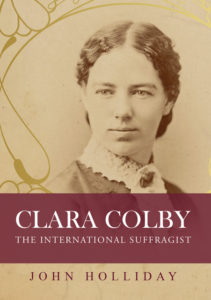 Encouraged by Anthony, Clara published the first issue of the Woman’s Tribune in 1883, a newspaper that was in continuous publication for 26 years, becoming the nation’s leading woman’s suffrage publication. She served as the President of the Nebraska Woman Suffrage Association, and she was the corresponding secretary of the Federal Suffrage Association, among her many other offices. From 1888, Clara spent the first half of each year in Washington DC, attending suffrage conferences and lobbying Congress members. She was very friendly and had many friends among influential leaders in the nation’s capital, including, for example, Caroline Harrison, the first lady of the day.
Encouraged by Anthony, Clara published the first issue of the Woman’s Tribune in 1883, a newspaper that was in continuous publication for 26 years, becoming the nation’s leading woman’s suffrage publication. She served as the President of the Nebraska Woman Suffrage Association, and she was the corresponding secretary of the Federal Suffrage Association, among her many other offices. From 1888, Clara spent the first half of each year in Washington DC, attending suffrage conferences and lobbying Congress members. She was very friendly and had many friends among influential leaders in the nation’s capital, including, for example, Caroline Harrison, the first lady of the day.
Clara Colby became an American citizen in 1888, but she never shed her identity as a migrant, which she revealed in an article, ‘A Plea for the English Government.’ In the article, she argued that the ideas of a free and enlightened people were not exclusive to America but were shared by the English. She said, “I sympathize most truly with my adopted countrymen, in all their struggles for liberty, in all their battles for the right, in all their aspirations and determinations for the future. I weep with Americans; rejoice with them; am injured and insulted with them, and am proud with them. But I want to know what causes influenced the Americans and made them what they are.” She reported that Pitt, the British Prime Minister, had praised the first Congress of the united colonies and said that no other body of men surpassed it. Its members were some of the men whom America is justly so proud of, and yet, they were English or the descendants of English, with minds expanded after the experience of the broad new world. The article displays someone who was always campaigning for the greater good.
By 1890, her husband had become General Leonard Colby of the Nebraska National Guard, when his troops served at the Battle of Wounded Knee. It was here that General Colby adopted the native-American baby girl, Zintka Lanuni, found under the body of her dead mother. Colby did so without discussing the situation with Clara and then left her to bring the child up, frequently without financial support. Clara’s response was to make a plan to bring her husband to Washington, so she lobbied her Washington friends and succeeded in getting her husband appointed as the United States Assistant Attorney-General.
Clara was always on the move across America, supporting state suffrage and lobbying state governments, and Leonard was just as busy in his new role. She tried to maintain a stable marriage, but her husband held a different view, often engaging in clandestine affairs, amid allegations of impropriety in business and public life. Clara’s further lobbying resulted in Leonard being appointed Brigadier-General in the United States Volunteers during the Spanish American war. Also, Clara became the first woman in the United States to receive a war correspondent pass. Holliday’s book reveals a secret conspiracy that Leonard became involved in during this conflict.
Eventually, a divorce was unavoidable, and as a result, many leading suffragists shunned Clara from then on, diminishing her legacy as a suffragist. Clara made four trips to Europe, attending the International Congress of Women (Amsterdam 1908, Stockholm 1911 and Budapest 1913) and the Universal Peace Congress in London in 1908 and The Hague in 1913. She also supported the suffragette cause in England, making speaking tours of England, Ireland, and Wales.
Back home, she campaigned throughout the country on behalf of the state suffrage organizations, helping to increase the number of states that supported women’s votes. During her career as a suffragist, twelve states and the Alaskan Territory had given women the vote. Another fifteen states had advanced legislation, which would result in those states giving women the vote before the Nineteenth Amendment. Her final state campaign was in October 1915 in New Jersey, where President Woodrow Wilson voted in favor of woman suffrage in his home state. His support was a good omen for a federal government amendment prohibiting both states and the federal government from denying the right to

NIEA Finalist
vote based on sex.
In 1915, Clara was the organizer of the Federal Suffrage Congress to be held at the Panama-Pacific International Exposition in San Francisco. July 12 was declared Federal Suffrage Association Day, which achieved the largest attendance of the special convention days with 56,255 people entering on that day. That evening, visitors could view a pageant to illustrate ‘Women in the Building of America,’ where Clara and her adopted daughter Zinka Lanuni worked together as a team. In the Court of Abundance, Clara gave a recitation standing on the pedestal of a towering column. In contrast, Zintka stood on another pedestal representing Sacajawea, a native girl who safely guided the Lewis and Clark expedition across the continental divide to the Pacific Ocean in 1805.2
By this time, she was living in Oregon, but she continued to spend several months each year in Washington, and the last big event of that winter was the hearing on the two suffrage bills, which came before the House Committee on March 27, 1916. The following letter from the Chairman of the Committee on Woman Suffrage shows the respect she received from the Members.
Mrs. Colby’s presentation of the Federal Suffrage law to these committees was such as to receive the unstinted praise of the Senators and Representatives. They heard her strong and logical arguments irrespective of the individual views held.3
During that winter in Washington, Clara Colby suffered badly from influenza. As soon as these hearings were over, she left for Eugene, Oregon, where the climate would be more favorable. Unfortunately, her health did not improve, and the flu became pneumonia. Clara’s sister Mary, a medical doctor, drove up from her home in Palo Alto to care for her but soon decided to take her back to California to recoup. They arrived in

John Holliday
Palo Alto on September 1, where Clara struggled to overcome her sickness. This fight for life was to be her last campaign, however, and she passed away on September 7, 1916.
The year 2020 marks the 100th anniversary of American women achieving the vote; after a suffrage campaign, which extended over 72 years. It took thousands of women to build the movement, which achieved ultimate success, but this is the story of one woman, whose contribution to woman suffrage is irrefutable.
By John Holliday, author of Clara Colby: The International Suffragist.

